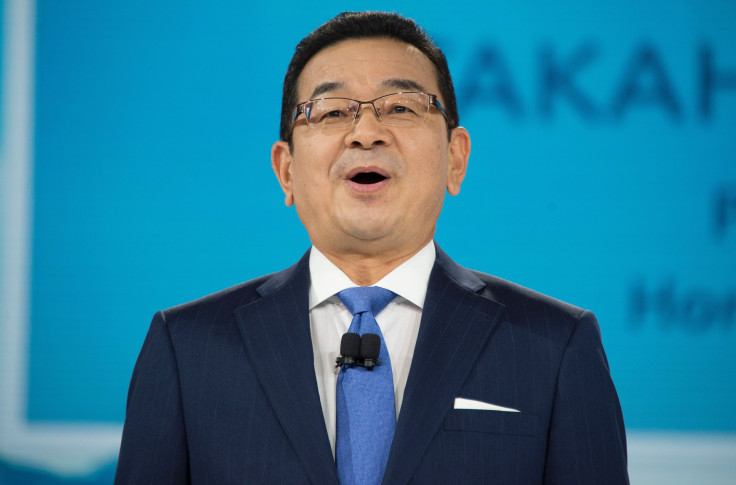Takata Recall: Honda CEO Takahiro Hachigo Says No Plans Of Rescuing Air Bag Maker

The president and CEO of Honda Motor Co. Ltd., Takahiro Hachigo, reiterated Wednesday that his company has no plans of arranging an independent financial bailout for air bag-maker Takata Corporation. The troubled air bag manufacturer has been trying to negotiate a deal with carmakers to divide the costs of recalls due to its malfunctioning air bags.
Hachigo said that the company’s current focus is just to find the cause of the problem and not to bail out Takata, despite being the auto parts maker’s biggest customer. Takata is recalling 50 million air-bag inflators likely to cause the air bags to inflate with too much force and spray shrapnel at drivers and passengers. The faulty air bag inflators have reportedly led to the deaths of 10 people and have injured 139 people worldwide, the Associated Press (AP) reported.
“We've said this before, but we are not considering offering any financial support to Takata,” Hachigo said during a media address, according to Reuters.
Hachigo made the comments while announcing an overhaul of the company’s vehicle development, along with changes to management and the organizational structure Wednesday. A report by Bloomberg said that the company has tried to introduce models and made attempts to expand too quickly.
Hachigo said that the company was “driven to launch models optimized for each region at a pace and scale beyond our means,” Bloomberg reported, adding that the company will rejig its product development structure, create new positions to look into the designs and determine the roles for quality, sales and other divisions.
“We began to see more organizational issues, such as unclear responsibilities of each area and insufficient level of delegation,” Hachigo said, according to Bloomberg, adding: “This could seriously harm the driving force engine behind Honda’s creativity.” Honda has been recalling vehicles since 2008 to replace about 30 million faulty Takata air bag inflators.
Koji Endo, an analyst with Advanced Research Japan, told Bloomberg before the management changes were announced Wednesday: “Their quality problem is still going on,” adding: “It’s not just one person’s responsibility; it’s the responsibility of the whole organization. I don’t know if just switching the top can solve all the problems.”
Speaking on the environmental strategies of the company, Hachigo said that two-thirds of its sales will be zero-emissions that include fuel cell and electric vehicles, hybrids, and plug-ins by 2030, AP reported. Hachigo also said that its new version of Clarity fuel cell will be sold in Japan from next month. The company has also been working on a net-general fuel-cell system with U.S. automaker General Motors that will be produced from 2020.
On Tuesday, the Independent Testing Coalition, which consists of experts investigating the faulty air bag inflators, determined the reasons behind the air bags exploding with excessive force and said that moisture and high humidity were among the factors. The coalition has been investigating the case for the past year amid recent investigations focusing on the usage of a mixture of ammonium nitrate and other chemicals by Takata to create a small explosion to inflate the air bags in the event of a crash.
Aerospace company Orbital ATK, which was hired by the coalition, said that an ammonium nitrate compound, such as the one used by Takata, that does not include a moisture-absorbing substance is likely to explode after being exposed to heat and moisture for a long period of time. The company also found that the inflator assembly used by Takata can let moisture seep in under very humid conditions, AP said in a separate report Tuesday.
The coalition added that the findings of its investigation are applicable to about 23 million of the 28 million air bags made by Takata that have been recalled by the U.S. government. The bags recalled contain a specially formulated ammonium nitrate that does not have a drying agent.
David Kelly, a former acting administrator of the National Highway Traffic Safety Administration and the coalition's project manager, said, according to AP, that this is the first time that exact reasons behind the explosions have been determined. He added that following these revelations, the design of the air bag inflators will be focused upon as will the performance of all the inflators being used to replace parts in the ongoing recalls.
“If you don't have the root cause, you're just throwing stuff up on the wall,” Kelly said, according to AP, adding: “You may never get to a situation where you can have an end game.”
© Copyright IBTimes 2024. All rights reserved.






















